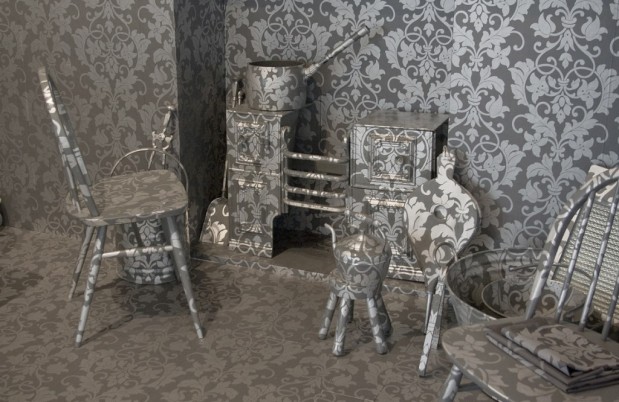Working from Home by Julie McCalden The Museum of Bath at Work, Till August 31st, 2015. http://www.bath-at-work.org.uk/working-from-home-julie-mccalden/
Julie McCalden has made an exquisite and hard hitting work for the Museum of Bath at Work. In the visual language of art, “Working from Home” brings attention to female, domestic labour and raises questions about museum practices that promote dominant histories which too often screen out the economic realities of women’s work and lives.
First you encounter the outer wall of rough wooden panelling (you are to know this is a construction). Then, stepping round to the front, the open ‘fourth wall’, you are looking into a room of the turn of the 19th into the 20th century, furnished with original items. The first impression is of a gorgeous, decorative beauty because, unexpectedly, the silvery patterning of the wall paper on a dark background is repeated over everything – the floor, chairs, tables, the iron stove – a reiteration that makes the whole scene appear to hover and shimmer.
Then your eyes adjust to see the exquisite and diligent craftswomanship and finish of the work. Everything – the clock, stool, cups and saucers, clothes hanging to dry, all diligently, neatly, precisely covered in pattern. There is a pleasure in the skill that carries that totalizing decorative effect – this rich subdued sheen of an orderly, homely interior. Clearly an ‘angel of the hearth’ has passed by here.
Then your mind adjusts and you realize that, beneath the pretty surface, all these objects are the tools of hard, demanding, essential domestic work. The iron stove that must be riddled, fueled and cajoled into life; the carpet beater, the wash tub and scrubbing board speak of back breaking manual work. The iron must be heated on the stove to attack the clothes hanging to dry, the stone waterbottle (these days sold as a decorative object) must be filled from the iron kettle and carried up stairs. And on the table is a pile of newly completed matchboxes – a common form of ‘homework’ that paid a pittance a piece and ate up long tedious, repetitive hours to augment a household budget under pressure.
Working From Home is hosted by the Museum of Bath at Work from which women’s work has been absent; it is an important intervention in an institution that had until now only acknowledged the history of the public practice of (usually men’s) work in factories and workshops. McCalden brings the private drudgery of female domestic work into this space and her own demanding, repetitive, diligent labour in making the piece echoes and expresses its subject. The exquisite decorativeness she produces gives form to the ideology of the ‘naturalness’ of ‘nurturing’ femininity that, drapped over hard domestic labour, prevents it from appearing as real economic work although no economy could function without it. As Lenin wrote in 1913:
Present-day capitalist society conceals within itself numerous cases of poverty and oppression which do not immediately strike the eye…Millions upon millions of women … live (or, rather, exist) as “domestic slaves”, striving to feed and clothe their family on pennies, at the cost of desperate daily effort and “saving” on everything—except their own labour. Capitalism and Female Labour, V.I.Lenin 1913
Working From Home is a powerful and important piece that deserves to be shown elsewhere.

Very interesting!
LikeLike
Glad it hit the spot!
LikeLiked by 1 person